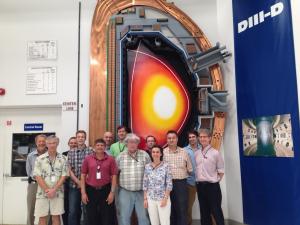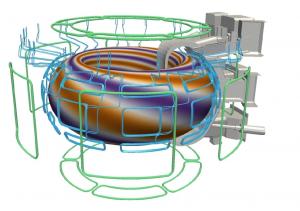Todd Evans, a pioneer in three-dimensional magnetic fields
Todd Evans led the initial effort to demonstrate that these ELM instabilities can be avoided by applying specially tailored 3D magnetic fields called resonant magnetic field perturbations (or RMPs), while the plasma retains the desirable features of the H-mode regime. He led the first pioneering experiments on the DIII-D tokamak by using a system of coils located inside the tokamak vacuum vessel and originally installed to control a different magnetohydrodynamic plasma instability (the resistive wall mode). In 2006, he published a seminal paper in Nature Physics demonstrating, for the first time, an "ELM suppression" scheme compatible with the edge plasma conditions expected in ITER.
Todd's achievement had a profound impact on the fusion community and on the ITER design itself. A whole host of fusion devices (such as ASDEX-Upgrade, COMPASS, JET and MAST (Europe); EAST (China); KSTAR (Korea); and LHD (Japan)) followed his lead, either by deploying existing coil sets or installing completely new systems to study this innovative ELM control scheme so important to the future success of ITER. As part of the ITER Design Review carried out in 2007-2008, the ITER Organization also started a series of studies to incorporate an in-vessel coil system to provide ELM control within the ITER baseline design. This required a series of engineering and physics studies, to which Todd was an essential contributor.
In addition to his direct contribution to the ITER design, Todd Evans has been a leading figure in driving R&D for the application of resonant magnetic field perturbations for the resolution of specific issues affecting ITER plasma performance, core-edge plasma integration and the development of the ITER Research Plan. Among the issues, are the use of resonant magnetic field perturbations for ELM suppression in helium plasmas during ITER's Pre-Fusion Power Operation phase*, and the fuelling of ELM-suppressed plasmas with pellets. His curiosity, perseverance, and willingness to help others understand complicated physics issues and to produce results of practical application to fusion development will be missed by the fusion community and by the ITER Organization.
Todd E. Evans died on 26 October 2020; click here to read an obituary published on the DIII-D website.
**During this phase of ITER operation, hydrogen and helium plasma scenarios will be developed to allow the full commissioning of all tokamak sub-systems (except those involving the use of deuterium or tritium) with plasma.



